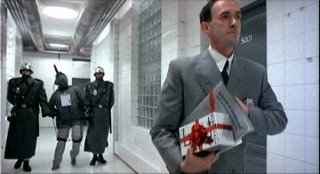Has Anybody Seen Sam Lowry?

Terry Gilliam’s 1985 film Brazil makes a profound declaration about the poverty of modern living. Clearly Orwellian, it portrays an atomized society where the people are subjugated to a system of deceptive images and technological barriers that isolate them from each other both physically and psychologically. As a critique Brazil seems more relevant today than when originally released. With plastic surgery and shopping all the rage, clever propaganda posted on every street corner, an unbearable paranoia regarding terrorism, and the acceptance of torture as a means of persuasion, the world of Brazil is only a slightly exaggerated version of the world we live in.
Stuck within this autocratic machine is the film’s protagonist, Sam Lowry, a dreamer and slacker, unconsciously searching for a way out. Suffering from a severe case of boredom Lowry often lapses into the dream state, where he has reoccurring fantasies of a particular woman he has never met. When he finally has a chance encounter with that woman, the scruffy Jill Layton, he is shaken from his weariness into a state of extreme giddiness, like someone who has fallen in love for the first time. Although Lowry never questions his position as a government agent he is quick to abuse that position in his romantic pursuit of Layton, and is even willing to cast it aside when he has convinced himself she is a terrorist. It is Lowry’s passionate drive towards Layton that gets him labeled a subversive by his peers, leading to his mental breakdown at the hands of an irrational government. While his eruption is a failure, snuffed out by the power of a totalitarian state, it is still genuine and raw, driven by a need for love, freedom, and poetry.
As a surrealist I have always identified with Lowry who, in spite of the corruption around him, persistently and magnetically follows his personal quest for love. Like Lowry, we too live in a corrupt terrain of technological overgrowth and psychological misery. Lowry sabotages this setting by opting to follow the trajectory of his dreams into his everyday life. Unfortunately, when all hope is lost, his dreams engulf, rather than harmonize with, his daily existence, demoting the question of dream and life to one of madness and delusion. Regardless of this closure, Lowry’s rejection of the reality those in power have created is a reminder to us that no system which undermines freedom can provide us with the intrinsic, emotive factors needed for the actualization of real life.
Brandon Freels
Hi! I saw Brazil for the first time at Xmas, and was also VERY struck by it. Powerful stuff! The opening scene i found very exhilarating! it still makes me grin. and the paper-eats-man i think is unforgettably poetic. and tho it is probably a pretty faithful 'orwellian' take, Gilliam-style, i found the film pretty upbeat in a serious, mindful way. In a small (or not so small) way, it changed my life. As the credits came up at the end and that cheesy 'brazilian' music is played, i will never forget the words the crooner croons on top of them: "we stood beneath an amber moon/ and softly whispered, someday soon.../ the morning found me miles away/ with still a million things to say..."
and that last line of the movie (still a milion things to say...) just hit me, straight into me, that this was Gilliam, undefeated, speaking, and it straightened my spine a little: that 'someday soon', getting ready, etc, is simply being silent, and that i should say all the things i know while i'm alive. and that means now, right now. It gave me some new year resolutions!
so, it really had a big effect on me. i also saw his Fear and Loathing in Las Vegas the same week, and found them a very good 'duo' of movies
recently i managed to see his new movie, Tidalworld, as it rushed through Seattle un-noticed and unreviewed. Gilliam says in the opening shot that, at the age of 64, he finally found his inner child, a little girl, and its made from her point of view. So i'd be interested for you to see it sometime, and your thoughts on how he deals in the film with 'dream' and 'reality.'
yrs, Martin (Seattle)
Posted by martin marriott |
10:11 PM
martin marriott |
10:11 PM